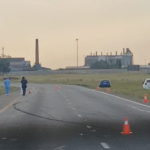The Kruger National Park, a vast and iconic wilderness in South Africa, is known for its breathtaking landscapes and incredible wildlife encounters. However, the park can also be a place of unexpected danger, as tragically demonstrated on 10 May 2025, when Petronella Margaretha Viljoen, a 68-year-old tourist, lost her life after an encounter with elephants.
Petronella, affectionately known as Ronel Blaauw Viljoen, was a resident of Brummeria, a suburb of Pretoria East. She was staying at the Sirheni Bushveld Camp, a remote and tranquil location in the park's northern Mopane veld region. Sirheni, one of Kruger's most northern camps, is known for its proximity to the Mphongolo River, attracting a diverse array of wildlife.
According to reports, Ronel left her cottage unnoticed in the late afternoon for a walk. Security camera footage later revealed that she exited the camp through the main gate, venturing onto the road leading into the park. Her husband reported her missing when he realised she was not in their accommodation. Park rangers and staff immediately launched a search operation, but it was not until around 11pm that her body was discovered.
Police spokesperson Colonel Malesela Ledwaba confirmed that Ronel had encountered elephants after leaving the camp, resulting in her death. By the time her body was found, the elephants had already moved on. The exact circumstances surrounding the incident remain under investigation by the Saselamani Police Station in the Collins Chabane Local Municipality, near the Kruger’s Punda Maria Gate.
The South African National Parks (SANParks) spokesperson, JP Louw, confirmed the tragic event and stated that the matter had been handed over to the police for further investigation. Out of respect for the family and in compliance with legal procedures, SANParks has refrained from providing additional commentary.
The incident has raised questions about safety protocols within the park and the potential risks faced by tourists who choose to explore the area on foot. While Kruger National Park offers an unparalleled opportunity to experience Africa's wildlife up close, it is essential to remember that these animals are wild and unpredictable.
Sirheni Bushveld Camp, where Ronel was staying, is situated on the banks of the Mphongolo River and is known for its abundant wildlife sightings. The camp's location attracts animals such as lions, hyenas, and leopards, which are often heard and sometimes seen near the accommodation. The camp also boasts two bird hides that offer excellent views of the river and surrounding area, providing opportunities for visitors to observe wildlife coming to drink.
The SANParks website warns tourists that elephants, lions, hippos, buffalo, and leopards often walk the fence line at night. Visitors who "must walk" are advised to carry a torch.
The circumstances surrounding Ronel's death are particularly unsettling. Reports suggest that she left her chalet in the late afternoon, but her body was not discovered until 23:00. This raises questions about where she was during those hours and what led her to encounter the elephants.
Security camera footage reportedly shows her walking out of the camp gates onto a dark road, where she was met by a herd of elephants, including calves. The animals, likely feeling threatened, charged at Ronel, trampling her to death.
The incident serves as a stark reminder of the potential dangers of walking alone in the Kruger National Park, especially at night. While guided bush walks are available, accompanied by trained field guides with backup rifles, these excursions are typically conducted during daylight hours.
Elephants, in particular, are known to be dangerous when they feel threatened or when protecting their young. These massive animals can weigh up to six tons, stand approximately 4 metres tall, and run at speeds of up to 40 kilometres per hour. An elephant charge is a force to be reckoned with, and even a glancing blow can be fatal.
Unfortunately, Ronel's death is not an isolated incident. In January 2025, Shaik Ahmed, a 59-year-old tourist, was trampled to death by an elephant in Kruger while trying to protect his grandchildren. In July last year, a Spanish tourist was killed by an elephant in the Pilanesberg National Park after approaching a herd of elephants drinking at a lake.
These incidents highlight the need for increased awareness and education about wildlife safety. Tourists visiting national parks and game reserves should be made aware of the potential risks and provided with clear guidelines on how to behave in the presence of wild animals.
In addition to safety precautions, there is also a growing need for effective strategies to manage human-wildlife conflict. This includes measures such as creating buffer zones between human settlements and wildlife areas, providing compensation to communities affected by wildlife damage, and implementing community-based conservation programs.
For the Kruger National Park, this means continuing to assess and improve safety measures within the park, including the fencing of camps, the provision of adequate lighting, and the enforcement of rules regarding walking outside designated areas. It also means investing in community outreach programs to educate local communities about wildlife conservation and the importance of coexisting peacefully with animals.
The death of Ronel Blaauw Viljoen is a tragedy that should not be forgotten. It serves as a reminder of the power and unpredictability of nature and the importance of respecting wildlife. By learning from this incident and taking steps to prevent similar tragedies from occurring in the future, we can help ensure that Kruger National Park remains a safe and enjoyable destination for all.
The name 'Sirheni' itself carries a somber significance, derived from the Tsonga word for 'cemetery.' This name originates from an incident in 1959 when an elephant died of anthrax and was buried near the camp. This historical context adds another layer of poignancy to the recent tragedy, reminding us of the inherent risks and the delicate balance between humans and wildlife in this region.
The investigation into Ronel's death is ongoing, and authorities are working to determine the exact sequence of events that led to the fatal encounter. It is hoped that the investigation will shed light on any potential safety lapses and provide recommendations for preventing similar incidents in the future.
In the wake of this tragedy, it is important to remember Ronel Blaauw Viljoen and to honour her memory by working to protect both humans and wildlife in the Kruger National Park. Her death should serve as a catalyst for change, prompting a renewed commitment to safety, conservation, and coexistence.
The incident also underscores the importance of responsible tourism. While it is natural to want to experience the beauty and wonder of the African bush, it is crucial to do so in a way that minimises risk to both humans and animals. This means following park rules, respecting wildlife, and being aware of one's surroundings at all times.
As the investigation continues and the community mourns the loss of Ronel Blaauw Viljoen, it is hoped that this tragedy will lead to a greater understanding of the challenges and opportunities of living alongside wildlife and a renewed commitment to ensuring the safety and well-being of all who visit and inhabit the Kruger National Park.

Follow Us on Twitter











